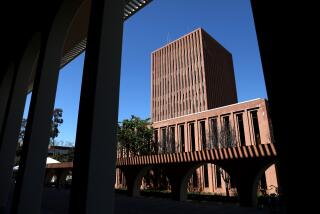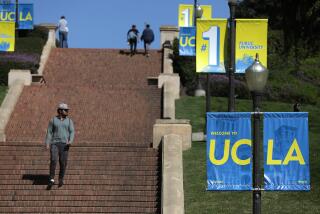Net Ed: Growing Pains
- Share via
James Perley, the head of the accreditation committee of the American Assn. of University Professors, recently decried online universities as a threat to the “preservation of higher education itself.” In the same scathing editorial in the Chronicle of Higher Education, he concluded that “it’s inappropriate, if not impossible, to accredit an entirely online institution using traditional methods.”
Perley’s apocalyptic screed is but the latest sign of concern among full-time college professors--whose jobs could be on the line--over the rapid growth of “virtual universities,” where students, via the Internet, meet in “virtual classrooms.”
The concern of the professors association was piqued in March when the North Central Assn. of Colleges and Schools decided to make Colorado-based Jones International University, which calls itself “the University of the Web,” the nation’s first fully accredited, entirely online university.
Professors worry that North Central’s decision will lead students to conclude that Jones University is academically comparable to traditional universities. The professors group rightly argues that such a conclusion would be premature because of North Central’s far-from-rigorous accreditation process, which North Central’s own executive director, Steven Crow, admits lacked “‘a valid system for evaluating student achievement.”
The American Assn. of University Professors sees online universities as a direct threat; such institutions use more part-time faculty than traditional universities and could undermine the job security of full-time, tenured professors.
There is little evidence to support Perley’s notion that “only full-time faculty members are fully effective mentors and teachers,” but it’s certainly possible that online universities that lack a core of dedicated, full-time faculty could turn into mere profit machines, grinding out high-demand courses rather than enriching minds.
Nevertheless, the possibility that online universities could be diploma mills should spur the professors group to positive action instead of counterproductive resistance. The association of professors can’t do much to stop the growth of distance learning, which is booming with the rise of the Internet and with workers’ increasing need to update their skills to meet rapidly changing economic needs. In 1998, corporations spent about $100 million on Internet-based training; by 2002, according to the International Data Corp., they will be spending about $6 billion per year.
The Assn. of University Professors should help develop objective national accreditation standards by working with groups like the American Academy for Liberal Education, a Washington-based agency that accredits undergraduate liberal arts programs nationwide and that is now researching ways of assessing online learning.
The alternative--letting online universities assess themselves, using accreditation merely as a tool to further their commercial self-interest--would be a disservice to both professors and students.
More to Read
Sign up for Essential California
The most important California stories and recommendations in your inbox every morning.
You may occasionally receive promotional content from the Los Angeles Times.













